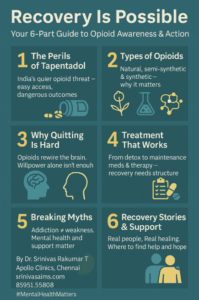Recovery Is Possible – Stories, Supports, and Steps Forward
Hope is real. Healing is possible. Help is here.
💬 Why This Matters
Most stories about opioids end in tragedy. But many, quietly and without fanfare, end in recovery.
This article isn’t about fear or science. It’s about hope.
About people who fought through darkness—and found their way back. About systems and supports that actually work. And about what you can do—as a professional, friend, or family member—to light the way forward.
👥 Stories of Recovery (Names Changed for Privacy)
🧑🔧 Mr.R, 33
Started tapentadol for tooth pain. Within months, he was injecting tablets. After 3 relapses, he was started on buprenorphine and weekly therapy. He now runs a bike repair shop and mentors others in recovery.
“I didn’t think I had a future. Now I’m helping others find theirs.”
👩⚕️ Miss.F, 28
Medical intern who misused tramadol to manage night duty fatigue. Her family noticed changes in mood and sleep. She entered a private rehab program with structured CBT and is now pursuing psychiatry as her specialty.
“I know what shame feels like. That’s why I’ll never judge a patient who opens up.”
👨🏫 Mr.S, 45
Teacher, diagnosed with depression and back pain, self-medicated with opioids. With dual treatment for mood disorder and addiction, he’s now stable and back to work.
“Recovery wasn’t one big thing. It was lots of small steps. But I kept going.”
🧰 What Helps People Recover?
✅ 1. Accessible Treatment
-
Buprenorphine and methadone when prescribed responsibly
-
Psychosocial support: CBT, group therapy, family involvement
✅ 2. Social Support
-
Family education reduces blame and improves outcomes
-
Support groups (e.g., Narcotics Anonymous India)
-
Online communities & helplines (eg., 14416)
✅ 3. Purpose and Routine
-
Work, volunteering, or structured day planning
-
Rebuilding identity and confidence beyond addiction
🌍 Community Resources in India
| Resource | Description |
|---|---|
| District Mental Health Programs | Offer free deaddiction services in most states |
| Apollo Clinics Velachery & Tambaram | Private OPD-based recovery care and medication |
| Nasha Mukt Bharat Abhiyan | Govt initiative with free community support |
| Narcotics Anonymous (NA) | Peer-led recovery meetings (online & offline) |
🔦 What You Can Do (Even if You’re Not a Doctor)
-
Be the first listener – Don’t wait for someone to “hit rock bottom”
-
Avoid moral judgments – Offer information, not insults
-
Encourage small wins – Every day clean is a victory
-
Share resources – A helpline or link can be the turning point
🕊️ Final Takeaway
Recovery is not a straight line.
It’s messy, humbling, and deeply human. But with the right mix of care, connection, and compassion—it is absolutely possible.
Let’s shift the narrative.
From fear to facts. From punishment to healing. From silence to stories.
🙌 Thank You for Joining This Series
You’ve now read through:
-
The Perils of Tapentadol
-
Understanding Opioid Types
-
Why Quitting is Hard
-
Evidence-Based Treatment
-
Myths & Mental Health
-
Recovery & Community Support
Together, these build a clearer, kinder, more clinical understanding of India’s evolving opioid landscape.
👨⚕️ About the Author
Dr. Srinivas Rajkumar T, MBBS, MD (Psychiatry)
Consultant Psychiatrist | Apollo Clinics Velachery & Tambaram
Specialist in Addiction Psychiatry, Psychotherapy, and Public Mental Health
📞 For consultations: 85951 55808
🌐 Articles and guides: www.srinivasaiims.com
📩 LinkedIn: Dr. Srinivas Rajkumar T
